From the developer of Dark Fall
It must be hard to live up to expectations when you have a successful first game. So what's the score card for the 2nd game from the developer of popular Dark Fall? Well, it is a good try, but I have to say the score is mixed at best. Dark Fall II: Lights Out gives you more or less of everything that already obtained in the previous game without much improvement.
Story is interesting enough
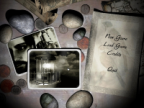 Even though the title says Dark Fall II, the story has little to do with the original Dark Fall. The only common elements are (1) a character named Polly White, a ghost-hunter in Dark Fall; (2) everywhere you go, the place is devoid of living things and full of eerie noises.
Even though the title says Dark Fall II, the story has little to do with the original Dark Fall. The only common elements are (1) a character named Polly White, a ghost-hunter in Dark Fall; (2) everywhere you go, the place is devoid of living things and full of eerie noises.
The year is 1912. You are Benjamin Parker, a young cartographer who has been hired to map the treacherous shores of Fetch Rock Lighthouse off the coast of Wales. Fetch Rock Lighthouse has been a strange, haunted place where bizarre things have happened over centuries. As Parker examines the Lighthouse and its environs, he becomes an accidental time traveler going back and forth between 2090BC, 1912AD, 2004AD and 2090AD, all on the same location.
The best I've figured out so far, the story is about something that caused a kink in the time-space-continuum that in turn caused the haunted lighthouse. As an avid sci-fi fan, I like the premise. But unfortunately this premise failed to develop into an engaging game.
Familiar, easy navigation, but…
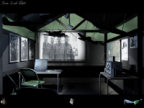 This game is a first-person point and click, just like Dark Fall. It uses the same navigation system - turn left, turn right, go forward. This isn't necessarily bad, as it is super-easy to learn the navigation. You also have the freedom to scan the frame for hot spots.
This game is a first-person point and click, just like Dark Fall. It uses the same navigation system - turn left, turn right, go forward. This isn't necessarily bad, as it is super-easy to learn the navigation. You also have the freedom to scan the frame for hot spots.
However, with fewer hot spots to scan for in a wider, darker area in this game, this primitive navigation is a pain in the neck. You waste quite a lot of time scanning the wall or scanning the dark corner only to find out that you have to be at a specific angle from a specific spot to find these hot spots. If the game had allowed a totally free panning, things would have been much easier.
Claustrophobic setting, maybe more so than before
The world you get to explore is not big. The initial game is played on a very narrow and crowded strip of real estate between the very small lodging of Parker and the tiny harbor where a small boat is moored. On the lighthouse island, things are not necessarily better. You don't have much room to move or get a bigger view. Every building, open area, and room is small, and there is not much wiggle space. It feels suffocating. At least in the original Dark Fall, you got to see a big chunk of the railroad station and the hotel, and space to wonder about for more than 2 or 3 clicks.
Graphics are better, but…
Graphics are definitely better. They use higher resolution (800 x 600) instead of 640 x 400 as in Dark Fall. The scenes are very realistic and atmospheric.
However, the scenes are of static beauty. The presentation of the game is still a slideshow style. Aside from the opening movie, there is no animated cutscenes. You look at objects, streets, buildings, from the predetermined viewing angles.
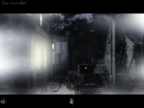 The time travel element of the story would have worked better if each era had come with something visually unexpected or extraordinary. 2090BC looks interesting with a primitive village on the marshes, but there is precious little to do or explore in that village. 2004AD lighthouse is indeed different from 1912AD lighthouse, but it only has things we expect from a lighthouse-turned-museum today. 2090AD is totally disappointing. The developer's imagination clearly failed describing this future. So about 84 years from now, are we expected to believe that we will still have a mechanical elevator for vertical transportation, dynamites for demolition, X-rays for diagnostics, and floppy disks for information storage? My computer (which was made in 2004) doesn't even have a floppy disk drive.
The time travel element of the story would have worked better if each era had come with something visually unexpected or extraordinary. 2090BC looks interesting with a primitive village on the marshes, but there is precious little to do or explore in that village. 2004AD lighthouse is indeed different from 1912AD lighthouse, but it only has things we expect from a lighthouse-turned-museum today. 2090AD is totally disappointing. The developer's imagination clearly failed describing this future. So about 84 years from now, are we expected to believe that we will still have a mechanical elevator for vertical transportation, dynamites for demolition, X-rays for diagnostics, and floppy disks for information storage? My computer (which was made in 2004) doesn't even have a floppy disk drive.
Supposed to be non-linear, but not really
The game, just like Dark Fall, claims to be non-linear. However, in order to board the boat from the initial location you will have to click on just about every hot spot you can find. All you really need is to talk to Demarion (the one who hired Parker) and pick up a floppy disk from his pantry, but unless you click on almost all indoor hotspots and some outdoor spots to be safe, the boat is not triggered. Other than the floppy disk, there is nothing you can collect as an inventory item.
There are close to 40 clickable items and places in the initial location. And you can only pick up one item and get to talk to one person. You do the math. It's rather unrewarding, wouldn't you say?
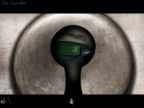 Once you land on the lighthouse island, you will be stuck there; you won't be able to take the boat back to the town again. And if you manage to reach the lighthouse, you still have to be on the predetermined path. [Editorial Note: Skip to the next paragraph if you do not want to read any detailed information about what to do during the first segment on the island] The trigger to the next age is the cave underneath the lighthouse. Even though you may know about the existence of the cave from reading Demarion's journal, for the ladder to the cave to be activated, you need Drake's map in his room on the third floor. To open Drake's door, you must have a lock combination, which is somewhere on the 1st floor. To get to the 1st floor, you need a light. To light up the place, you need to start the boiler in the basement… Get the idea?
Once you land on the lighthouse island, you will be stuck there; you won't be able to take the boat back to the town again. And if you manage to reach the lighthouse, you still have to be on the predetermined path. [Editorial Note: Skip to the next paragraph if you do not want to read any detailed information about what to do during the first segment on the island] The trigger to the next age is the cave underneath the lighthouse. Even though you may know about the existence of the cave from reading Demarion's journal, for the ladder to the cave to be activated, you need Drake's map in his room on the third floor. To open Drake's door, you must have a lock combination, which is somewhere on the 1st floor. To get to the 1st floor, you need a light. To light up the place, you need to start the boiler in the basement… Get the idea?
After you discover a certain item, the game does become more non-linear. But that's after almost half of the game is played rather linearly.
Nonsensical and arbitrary puzzles
To solve the puzzles, you investigate, collect items, and read journals, as in Dark Fall. However, in Lights Out, you investigate less, collect FAR LESS, and read journals, books and exhibits WAY MORE. Your inventory bar will not come close to full until toward the end of the game. Most of the time there are only a few items.
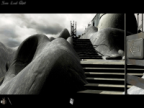 When it comes to logical thinking in puzzles, the developer and I seem to live not only in different times but on different planets. Unlike in Dark Fall, I find the puzzles in this game nonsensical and arbitrary.
When it comes to logical thinking in puzzles, the developer and I seem to live not only in different times but on different planets. Unlike in Dark Fall, I find the puzzles in this game nonsensical and arbitrary.
Let me give you one example of arbitrary nature of the puzzles. You are supposed to observe 4 different symbols in four different colors that will be needed in the end game. Two of the symbols are so easy to miss because there is no indication or warning that there are such symbols to look for in certain places. One of them is the symbol you see if you enter the cave in 2004 Fetch Rock. That is, IF you enter the cave. There is no explicit or implicit logical need to do so.
Journals, and more journals!!
Just like Dark Fall, this game relies quite heavily on having the player read displays, journals and books. However, this reliance is has gone overboard. Even though I agree that this is not a game that you want to zip through, there is so much reading to do that it effectively dampens the enthusiasm of the player to continue.
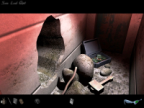 Ever since Myst was released in early 1990s, adventure game developers may have come to a very erroneous conclusion that adventure gamers love reading pages and pages of journals. Yes, if they are interesting. No, if they are boring. (Duh.) Unfortunately this game is the latter.
Ever since Myst was released in early 1990s, adventure game developers may have come to a very erroneous conclusion that adventure gamers love reading pages and pages of journals. Yes, if they are interesting. No, if they are boring. (Duh.) Unfortunately this game is the latter.
What is more, journal reading was more or less optional in Myst, and when there was a clue for a puzzle within the journal the clue was made conspicuous - either by bold type face or some schematic drawing - so that you could spot it easily as you flipped through the pages. I read almost all journals in all of Myst games, because they were fascinating as they provided insights into strange worlds and characters in the games.
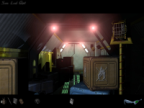 In contrast, I failed to find ghost stories in an obscure region in Wales or the poorly written journals interesting. And to fish out the puzzle clues from what seems like endless gibberish in the books and journals, forget it. For one, I totally missed a clue on door knocking in Polly White's journal, because her handwriting was terrible and the journal was long and the content was so boring, and blah blah blah. As a result I was stuck in front of the door for a long time.
In contrast, I failed to find ghost stories in an obscure region in Wales or the poorly written journals interesting. And to fish out the puzzle clues from what seems like endless gibberish in the books and journals, forget it. For one, I totally missed a clue on door knocking in Polly White's journal, because her handwriting was terrible and the journal was long and the content was so boring, and blah blah blah. As a result I was stuck in front of the door for a long time.
Pixel hunting at its worst
Another excess of this game is pixel hunting. There are many dark or ill-lit places, and to scan the screen with the mouse to locate a hot spot without the benefit of free movement and 360-degree view is asking too much.
You are forced to do pixel hunting, because (1) there are not many hot spots in the game to begin with; (2) often, the hot spots are not placed in a logical spot. There are many items you can click on, which are located in plain view. However, important clues are often hidden in the dark where you wouldn't even think of looking. One good example is the EVP/EMP detector in 2004 Fetch Rock. Even if you can figure out from the pathetic drawing by Polly (I couldn't) that you are supposed to locate this special pair of glasses in the World War visitor center, you still have to do some intensive pixel hunting in obscure corners to find them.
Lack of interactivity
Another minus that is more conspicuous this time around is lack of interactivity. You can examine many items but you get to collect very few of them. The items you can examine - cups, pots, bottles, keys - don't give you much insight into what's going on.
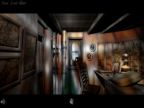 As Parker, you only meet two people. Or, to be exact, half the face of one person, and one eye of the other. The encounter with the latter is simply ridiculous. You have to knock on the door in codes like a third-rate spy movie. Both encounters are just one-time affairs, and you are left alone again. I suppose you could say it's an improvement from Dark Fall, where the interaction with another being was with an invisible boy with heavy cockney accent.
As Parker, you only meet two people. Or, to be exact, half the face of one person, and one eye of the other. The encounter with the latter is simply ridiculous. You have to knock on the door in codes like a third-rate spy movie. Both encounters are just one-time affairs, and you are left alone again. I suppose you could say it's an improvement from Dark Fall, where the interaction with another being was with an invisible boy with heavy cockney accent.
End game?
So I fought the boredom and managed to reach the end game. But what end game? What happened to all people who disappeared? What happened to the haunted lighthouse? What happened to Parker? Was he no longer a suspected killer? Would he still exist, after the past was altered? The game answers none of these questions.
At least in Dark Fall, you had a satisfaction in knowing that what you did made a difference. In Lights Out, you will never know the consequence of your action. This is highly unsatisfying for adventure gamers.
Game play glitches
Even though this is not a big game which fully installs on the hard disk, it kept crashing my computer. After I changed to the Compatibility Mode, it crashed less, but remained very unstable. I couldn't find any patch or help online.
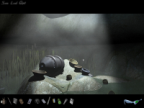 Sometimes the movement cursor fails to appear where they should appear. After a few clicks they usually come back. Some hot spots are not precisely defined.
Sometimes the movement cursor fails to appear where they should appear. After a few clicks they usually come back. Some hot spots are not precisely defined.
Subtitles would have helped. Even though there are not many places where you hear people speak, I would have still appreciated subtitles. I couldn't understand a single word uttered in a particular sequence!
So what's next?
I am eternally hopeful that there will be an independent adventure game developer, somewhere, someday, who will wow me the way the game Myst did so many years ago. This developer's first game had a promise. But two years after the first one, I don't see much improvement. The graphics are better and more atmospheric, but other than that it feels and plays the same. Worse, the game's overemphasis on reading for storytelling and for clues for puzzles effectively kills enthusiasm of the player. It surely killed mine.
I finished the game simply because I didn't like to feel defeated by a mediocre game. In the end credits, the developer thanked me for my time. I didn't want gratitude. I wanted an exciting game! Alas, this was not it. My time would have been better spent elsewhere.
The developer seems to have joined force with an entity called Darkling Room based in Cornwall in 2005. Their next game looks like another ghost-buster story, this time on England's east coast. I don't know. Maybe only those people who are interested in ghost stories in that region of England may find it worth the time and money. I'll keep a cautious distance, for now.
My score is 50 for this game. I am rather disappointed, although I haven't totally written off this developer yet.
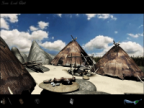 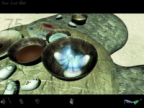
|
